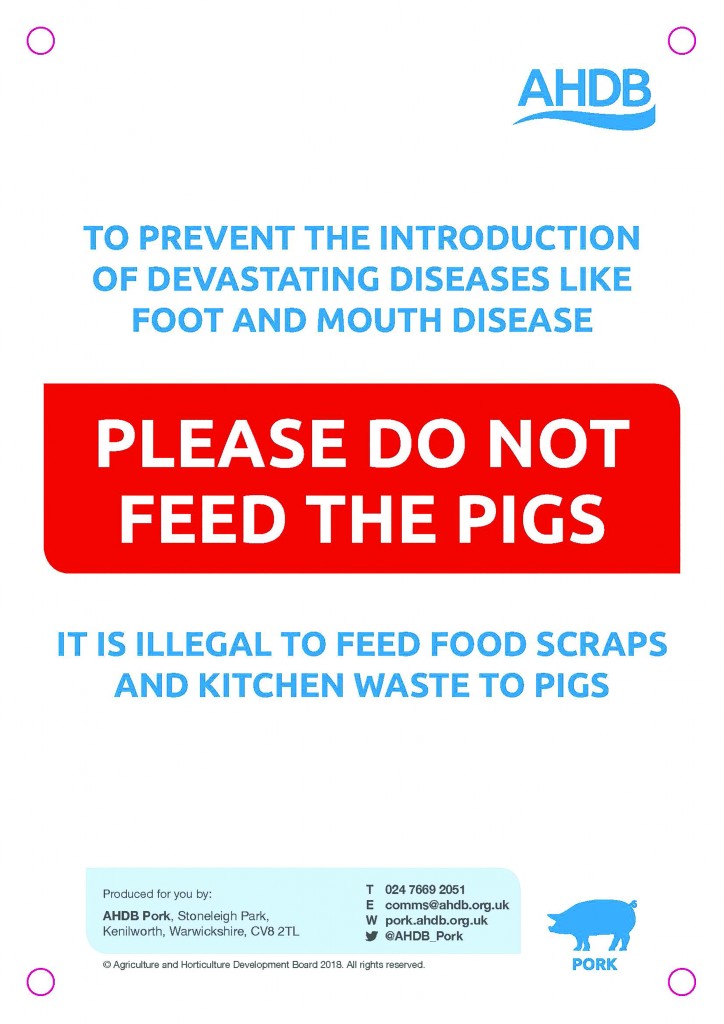The underlying message from the Defra report on the UK’s ASF risk status is that a collective effort is needed to keep the virus out – from producers and the allied industry to Government and its agencies, the public, hauliers, the media and more.
NPA chief executive Zoe Davies, who spoke of her own horrific experience of dealing with the 2000 Classical swine fever outbreak during a BBC Countryfile feature on the threat posed by ASF in January, has highlighted areas where more could be done.

EXPOSURE TO INFECTED MEAT
The NPA is urging all producers to put up signs available from AHDB (pictured) to warn the public not to feed pigs (email comms@ahdb.org.uk to request the signs).
Dr Davies said: “One of the biggest concerns is that outdoor pig units near roads, especially lay-bys, and public footpaths and indoor or outdoor units close to a public right of way could be exposed if members of the public fed pigs contaminated meat, for example through discarded sandwiches. This was the most likely cause of the 2000 Classical swine fever outbreak.”
SMALLHOLDERS
“While there is widespread compliance with the swill feeding ban among commercial producers, more needs to be done to ensure smallholders and pet pig owners understand the risk of feeding kitchen scraps to their pigs and that this is illegal,” Dr Davies added.
EASTERN EUROPEAN WORKERS
There are strict protocols in place for visitors to farms, including a ‘rest period’ of at least three days for people who have returned from abroad. “But there is a risk some Eastern European workers could bring contaminated products back from visits home,” she added.
“We need to ensure all staff understand that pork products must not be brought onto the farm, including by visitors and delivery drivers.”.
FERAL BOAR
The NPA is calling for a more coordinated and effective approach to management of feral pig populations, before it is too late.
“Defra needs to revise the outdated 2008 Feral Wild Boar Action Plan and help shape a UK feral wild boar strategy,” Dr Davies said.
AHDB is running a social media campaign urging the public to #KeepWildBoarWild, stressing that feeding wild boar ‘can be dangerous for their health and spread diseases that affect all pigs’.
BORDER CONTROLS
No progress has been made on border controls, Dr Davies said.
“We will continue to press Defra to insist that UK Border Force takes this issue far more seriously than it has to date and increases the level of resource dedicated to intercepting illegal imports of potentially contaminated pork,” she added.
“We would also like to see much better visible communication to passengers and lorry drivers entering the UK via ports, airports and on Eurostar about the disease risk of illegally importing pork products from affected areas and discarding them in areas where pigs can gain access.”
For more information, see the dedicated ASF section on the NPA’s website, including a comprehensive new briefing.
The global picture
Belgium/France
At the time of writing, around 350 cases in wild boar had been confirmed since the virus was first discovered in the Belgian region of Luxembourg in September. The virus has not yet reached domestic pigs. However, France is now on high alert, including planning to cull wild boar and erecting fencing near the border, after the virus was confirmed in two dead animals about 1 km from the French border in January.
Eastern Europe
The number of cases in domestic pigs in affected countries has fallen every month since July. There were just 27 cases recorded in December (including 22 in Romania), compared with 437 in July, according to APHA’s latest update. However, cases in wild boar have remained consistently high, increasing in December, with almost half the cases reported in Poland, which is planning to cull 185,000 wild boar, according to reports.
Denmark
Authorities have started building a 44-mile, £3.5 million fence along the border with Germany to keep out wild boar in anticipation ASF could reach German soil.
China
ASF has been reported in 26 provinces (all but five) in more than 100 outbreaks since August with more than 900,000 pigs culled. The authorities report that over 60% of the outbreaks are associated with feeding swill or catering waste to pigs.
Australia
ASF virus was found in six pork products brought into Australia in January, as the border authorities tested 152 products at airports and mail processing centres. There have been similar reports from Taiwan, South Korea and Thailand.




